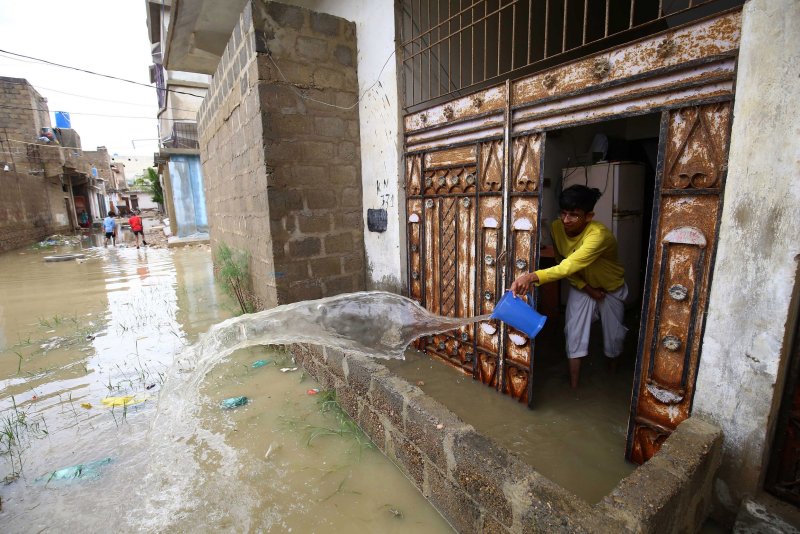1 of 5 | Residents drain water from their homes after heavy monsoon rains in Karachi, Pakistan, on July 11. File Photo by Shahzaib Akber/EPA-EFE
Sept. 9 (UPI) -- United Nations Secretary-General Antonio Guterres on Friday said the international community owes it to Pakistan to contribute billions of dollars to help the Middle Eastern nation recover from this summer's deadly monsoon floods.
Guterres made the remarks during a trip to Islamabad, where he met with Pakistani Prime Minister Shehbaz Sharif. The U.N. chief said that nature has not been kind to Pakistan, which has sustained at least $30 billion in damages from the flooding. About 1,400 people have died due to the severe weather.
Guterres noted that climate change -- and the country's failure to take measures to fight global warming -- are important contributors to the disaster.
"Pakistan suffers -- yet has done almost nothing to contribute to climate change," he wrote in a tweet Friday. "I urge countries to generously support the humanitarian response, recovery and reconstruction as a matter of solidarity and justice."
"Pakistan needs massive financial support," he said at a news conference in Islamabad, noting that the entire country looks "like a sea" due to the floodwaters.
Guterres was in Pakistan for a two-day visit amid the widening weather crisis that began with the start of the monsoon season in July. Previous estimates put the total damage around $10 billion.
"You wouldn't believe the scale of destruction," Sharif said on Thursday after the death toll grew, according to NBC News. "It is water everywhere as far as you could see."
![]()
Flooded streets are seen in Nowshera District, Khyber Pakhtunkhwa province, Pakistan, on August 27. Officials say more than 33 million people have been affected by disaster. Photo by Bilawal Arbab/EPA-EFE
About half a million people have lost their homes in Pakistan, which has led to hundreds of tent communities across the landscape -- causing concern about potentially spreading diseases in the makeshift environment.
Pakistan's National Disaster Management Agency says at least 33 million people have been affected by the floods.
Emergency aid has been arriving from around the world, such as the United Arab Emirates and United States, which has given $30 million.
"We are heading into a disaster," Guterres added. "We have waged war on nature and nature is tracking back and striking back in a devastating way. Today in Pakistan, tomorrow in any of your countries."
The devastating floods come at a bad time for Pakistan, which was already facing an increasingly fragile economy amid high energy costs. Analysts fear the catastrophe could shrink Pakistan's economy after a 5% increase was previously projected for the coming year.
Officials in Sindh province have been conducting controlled water releases at Lake Manchar, which threatened to spill over its banks earlier this week. Last-minute emergency measures prevented that from happening. Hundreds of roads and bridges have been damaged or destroyed.
Pakistan's military has mobilized to help with evacuations and delivering food and critical supplies, but in many cases the aid has been slow to arrive.
Two weeks ago, Guterres made a similar appeal in announcing a global effort to raise $160 million in emergency aid. The International Monetary Fund said it would put up about $1.2 billion from a 2019 bailout agreement to keep Pakistan from defaulting on its national debt.
















